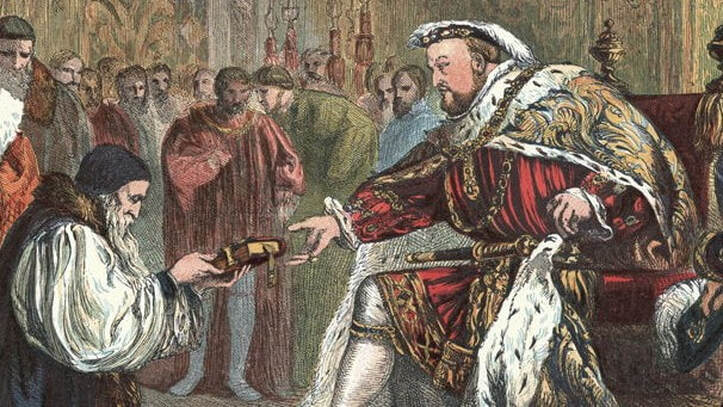|
As a native born Southerner of British origins I am culturally what I call a 500-Year-Protestant. I can say that my people have been Protestant since their-lord Henry VIII decided that he needed to get in front of the Protestant Reformation, crown himself head of the church in England, and divorce and remarry whomever he wished. And confiscate church property while he was at it. Prior to that of course my people in Britain were Catholic and doubtless accepted the commonly held worldview of that time. The Reformation would see a new religious division added to the ordinary dynastic and resource struggles of that age. The 16th century would give my people Bloody Mary, Good Queen Bess, and a hatred of the Spanish. Times were a’changing and my people changed with them, and then eventually they began crossing the Atlantic in wooden sailing ships, bringing the entirety of who they were as Englishmen, or Scotsmen, or Scotch-Irish to a New World, coming, in time, to identify themselves as Virginians or Carolinians, and then eventually as regular Americans, i.e. Southerners. All along the way they would become Anglicans, Presbyterians, Methodists, Baptists, or church of Christ, and be deeply animated by these faiths. By the passage of time, these and other divisions would emerge, as would unifying moments. But at all times my people were being shaped by the times, as were your people, and this process continues today. Our ancestors carried the baton where they would, which they passed to us who are bobbing and weaving through woods as best we can or know how, and we will pass it on to our offspring who will continue the race more or less kind of in the general direction that we’ve been sort of heading. It has been a long time since the memory of the times of Queen Elizabeth I animated us collectively, to say nothing of Edward III, or Harold II, or Alfred the Great. Didn’t he conquer Persia or something? And then who were Hengist and Horsa? That we do not remember them does not mean that what they were and did does not live on through us. Yes the water is flowing into the Gulf of Mexico, but only because it snowed in the Rockies. But we do remember George Washington. He is on the dollar bill and the quarter, and has something to do with the 4th of July, which has something to do with America. A state was named after him and he was a pretty good feller. Something about a cherry tree too. Likewise Abraham Lincoln was honest and freed the slaves. Robert E. Lee was noble and the South’s finest. And Martin Luther King led his people to freedom against the South’s worst. However, there is a new division today that makes the Reformation look like a misunderstanding. A new history maker that sees things very differently; that is insisting that we forget what we think we know and remember; insisting instead that we know and remember what it knows and remembers. A New American who has almost no tie with the land and no sense of our founding traditions, much less what pre-dated and produced them. It is commonly known today as Woke-ism, the most recent radical manifestation of Progressivism. The differences between Catholic and Protestant were grave and have been consequential. Enormously so at the macro level. But that is nothing compared to what Progressivism had already achieved prior to 2020, and heaven forbid, what it appears bent on doing now. Sadly the division that Progressivism has created, and that its offspring Wokism is creating in our culture is likely to be permanent and enduring. But the great difference between it and Protestantism is that the latter held fast to the Book and never abandoned a common sense understanding of basic human nature, and this has allowed Protestants and Catholics to, more or less, sorta, kinda get along. And almost to unite in the face of an enemy that appears to want to redefine the answer to two plus two. This piece was published on Look Away on October 6, 2022.
1 Comment
‘Hard times create strong men, strong men create good times, good times create weak men, and weak men create hard times.’ G. Michael Hopf, Those Who Remain There are two constant imperatives borne of man’s human nature. He will first seek security, and then contentment or pleasure. These ideas may be summed up in the ancient adage Bread & Circuses, and he who can give either of those to the Common Man will be amongst the rulers or elite of the people. Security is difficult to attain, and if you look at history from 80,000 feet, evidently exceptionally hard to maintain for long. And even the Common Man today who has lived sixty years and remembers anything of the lives of his grandparents knows enough of the risings and fallings of man’s works to appreciate the truth of this. Surviving has been a struggle for us humans during the overwhelming majority of our known history and presumably the entirety of pre-history. And getting and staying ahead is difficult even in fat times. This is just the nature of things. It is the nature of things because if I do not raise that fork to my mouth, no one else will, and if I do not guard the contents of my plate, someone else will eat from it. I can lay in the grass for a bit, but if I do not seek shelter, eventually I’ll freeze to death, or die of pneumonia, to be eaten by ants, my bones eventually just returning to dust. So we must struggle and if the struggle doesn’t break us, it makes us stronger and wiser. And becoming stronger and wiser contributes to our security which can lead to greater contentment and pleasure. Eventually, due to the strength born of our struggle (or our ancestor’s struggles, for we inherit a great deal more than just their looks) we achieve a degree of security sufficient to allow us to devote more time and energy to the pursuit of contentment or pleasure. The problem is that we humans are shortsighted. Living off the fat of our labours, or just good fortune, it’s at this point that we usually neglect the struggle which made us strong. Thus we become weak again, which forces us to struggle once again. And the whole cycle begins anew. This cycle can only be short-circuited during the good times via understanding, wisdom, and discipline. By understanding we mean correctly interpreting our circumstances. By wisdom we mean knowing what is best or right. By discipline we mean doing that which is best or right even when we do not have to. This was originally published on Look Away on Sept. 23, 2022.
|
AuthorMark Atkins has six wee bairns who are all seventh-generation Henry County, Tennessee, and all from the same doe. It is the people of Henry County that he most wants to reach but writes to Southerners generally. He is without credentials but rather dares to speak by the same authority as the little boy who cried 'The king has no clothes!' His core belief and starting point is that like everything, we humans have a nature, it is not so hard to understand, and to pretend that it is other than it is, is to jump off a cliff. Which is what we Americans have in fact done. Archives
October 2023
|


